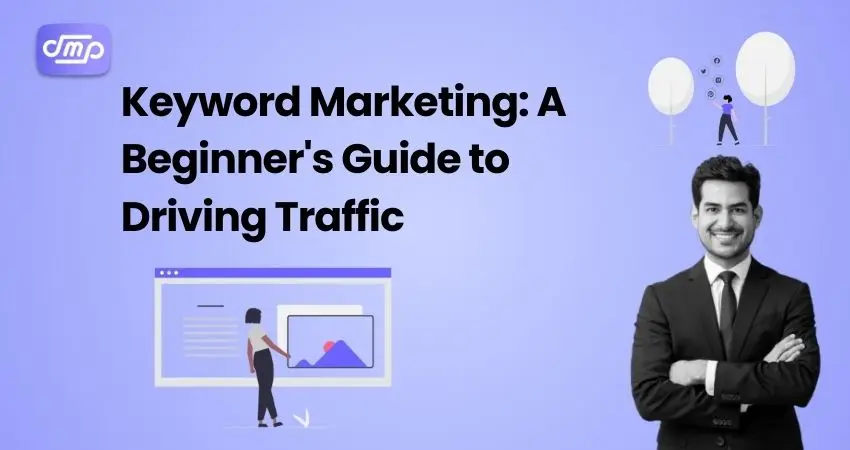
- September 20, 2024
- Content Writing, Digital Marketing
- Digital Marketing
Table of Contents
Keyword marketing is a core part of digital marketing that involves employing certain words or phrases (keywords) to optimize content, create targeted visitors, and boost search engine visibility. To rank better in search results, you must first find the terms your audience is searching for and then carefully incorporate those keywords into your content, adverts, or website.
In the digital age, customers frequently use search engines such as Google to find information, products, or services. This is where keyword marketing comes in handy—it allows businesses to connect with their target audience by employing the precise terms that people enter into search engines. Aligning your content with these keywords increases your chances of appearing at the top of search results, which, in turn Results can lead to increased website traffic, greater engagement, and improved conversion rates.
Why Keyword Marketing Matters
- Increased visibility: Higher search engine results mean greater exposure for your brand.
- Drives targeted traffic: Attracts users who are actively looking for the information or services you offer.
- Improves SEO: Keyword marketing is an essential component of search engine optimization (SEO), benefiting both on-page and off-page SEO activities.
- Increases ROI: Whether through organic search or paid ads, good keyword marketing can result in a higher return on investment (ROI) by targeting the correct audience at the right time.
Steps to Start with Keyword Marketing
Getting started with keyword marketing can be daunting if you’re new to it. However, by taking a methodical approach, you may create an effective strategy for driving visitors and improving your search ranks.
Step 1: Understand Your Target Audience
Before you begin keyword research, you must first determine who you hope to reach. Ask yourself:
- Who is your ideal customer?
- What are their concerns, interests, and needs?
- What types of content or solutions are they looking for online?
Understanding your audience allows you to select keywords that fit their intent and keep your material relevant.
Step 2: Perform Keyword Research
The next step is to determine the keywords that your target audience is searching for. Use trusted tools to find high-traffic, low-competition keywords:
- Google Keyword Planner mostly provides search volume and keyword ideas.
- SEMrush or Ahrefs are advanced tools that offer thorough keyword analysis and competition data.
- Ubersuggest is a user-friendly tool for finding long-tail keywords.
When researching, seek for:
- Short-tail keywords are single or two-word phrases. These are often extremely competitive.
- Long-tail Keywords, longer, more precise words. These have less competition and can generate more tailored traffic.
Step 3: Analyze keyword metrics
Not all keywords are created equally. Once you’ve compiled a list, analyze each keyword using:
- Search Volume: Look for how many people are searching for this term monthly.
- Competition: Check for how hard is it to rank for this keyword.
- Relevance: Is the keyword relevant to your content and your target audience?
- Prioritize keywords: Keywords that have a good balance of high search volume and low competition, but keep relevancy in mind.
Step 4: Organize and create your keyword list
Now that you’ve investigated keywords, categorize them according to:
- Primary keywords are the major topic of your content or website(for example, “keyword marketing”).
- Secondary keywords are connected to the principal keyword (for example, “SEO keyword strategy” or “boost website traffic”).
- LSI (Latent Semantic Indexing) Keywords, related terms, and variations to increase SEO context (for example, “search engine rankings,” “long-tail keywords”).
Step 5: Integrate Keywords into Your Content
To produce results, your keywords must be successfully integrated into your content. Here’s what to do it:
- Titles and headlines: You must use primary keywords in the title and H1 tags.
- Meta Descriptions: To enhance click-through rates, write brief, compelling descriptions that use keywords.
- Content Body: Keywords are naturally included into the content, facilitating readability. Avoid keyword stuffing!
- Alternative Text for Images: Use descriptive keywords in your image alt text to increase accessibility and SEO.
- URLs: Include important keywords in the page’s URL to improve SEO.
Step 6: Focus on User Intent
When choosing and inserting keywords, keep user intent in mind. Ask yourself:
- Informational intent: Are they seeking information or answers?
- Navigational intent: Are they looking for a specific site or brand?
- Transactional intent: Are they prepared to purchase or sign up?
By matching your terms to the intent underlying Searches can help you guarantee that your content resonates with visitors and increases conversions.
Step 7: Update and monitor your keyword strategy
Keyword marketing isn’t a one-time activity. Continuously track the performance of your keywords with tools like Google Analytics or SEMrush. Check stats like this
- Search ranks for your desired keywords.
- Organic traffic growth.
- Engagement rates (e.g., click-through and bounce rates).
Based on performance, adjust your keyword strategy on a frequent basis to keep ahead of competition and changing trends.
On-Page and Off-Page Optimization using Keywords

To achieve efficient keyword marketing, you must optimize both the on-page and off-page parts of your website. This dual technique ensures that search engines grasp your content’s relevancy while also increasing credibility and authority via external sources. Here’s how to employ keywords for both on-page and off-page SEO:
On-Page Optimization using Keywords
On-page SEO refers to improving aspects on your website in order to increase search engine rankings. Here’s how you can properly employ keywords:
1. Optimize title tags and meta descriptions
- Title Tags: The title tag is the clickable headline displayed in search results. Ensure that your major keyword shows organically in the title and does not exceed 60 characters.
- Examples include: “Keyword Marketing Strategies to Drive Traffic in 2024.”
- Meta Descriptions: This brief description summarizes your page’s content. Use your major keyword and make it fascinating to increase clicks. Limit it to 160 characters.
2. Use keywords in the headers
- H1: Your main heading should include the primary keyword since it establishes the context for the content.
- H2/H3: Use secondary and LSI keywords in subheadings to improve your content’s scannability and SEO.
3. Keyword placement in the content body
Use your keywords naturally throughout the material. Ensure that the major keyword is stated early, ideally within the first 100 words. Early on, especially inside the first 100 words, employ variations (secondary and LSI keywords) throughout. Maintain a keyword density of approximately 1-2%. Avoid stuffing keywords, as this might impair readability and SEO rankings.
4. Image Optimization
- Alternative Text: To explain images, include relevant keywords in their alt text. This allows search engines to index your photographs and boosts accessibility.
- Alt text: “Keyword research tools for SEO.”
- Image filenames: Before uploading, use descriptive keywords instead of general names (for example, “keyword-research-tools.jpg” rather than “image123.jpg”).
5. URL Structure
Include your major keyword in the URL to help search engines and users comprehend the page’s topic. Example: www.example.com/keyword-marketing-tips.
6. Internal Linking
Link with informative anchor text that includes relevant keywords. Link to additional pages on your website. This promotes link equity and enhances navigation.
Off-Page Optimization using Keywords

Off-page optimization refers to efforts taken outside of your website that affect rankings, primarily through backlinks, social signals, and brand mentions. Off-page SEO also relies heavily on keywords.
- Anchor Text in Backlinks: When other websites link to your material, make sure the anchor text (clickable text in a hyperlink) contains relevant keywords. However, it should be natural and not overly optimized. For example, a blog article linked to your guide with the anchor phrase “best keyword marketing tips”.
- Guest Blogging: Write guest pieces for respected websites, including keyword-rich backlinks that point back to return to your site. This raises your domain authority and increases traffic.
- Social media signals: Share your content on social networking networks and include important keywords in the post description. While social signals (likes, shares, and comments) do not have a direct impact on rankings, they do increase the reach of your content and raise awareness.
- Influencer Marketing & Brand Mentions: Collaborate with influencers or bloggers in your industry who can mention your brand and content in posts. While brand mentions alone may not have direct keyword value, they do increase visibility and prospective backlinks.
- Directory listings and business profiles: To improve local SEO, list your business on List your business on directories like Google My Business and industry-specific websites to improve your local SEO. Use relevant keywords in your business description and profile to boost your local search rankings.
- Forums and Community Engagement: Participate in industry-related forums or Q&A sites such as Quora, Reddit, or niche-specific groups. Answer questions or participate in discussions by naturally inserting keywords related to your content or services, and include a link to your website when appropriate.
Keyword Marketing vs. Keyword Research
Keyword marketing and keyword research are both necessary components of a great SEO strategy, but they serve different functions in the overall process of driving traffic and boosting visibility. Understanding the distinction between these two phrases is critical to developing an effective digital marketing plan.
Keyword marketing and keyword research are closely connected but play distinct functions in the realm of digital marketing. This is how they differ:
Keyword Research
- Definition of Keyword Research: Keyword research involves identifying and evaluating search phrases used by users to find content on search engines. The goal is to find relevant keywords that will generate organic traffic to your website. Data-driven study to identify the most relevant terms for a given niche or demographic.
- Purpose: To identify high-performing keywords based on user intent, competitiveness, and search traffic.
- Tools: Activities include using tools such as Google Keyword Planner, Ahrefs, SEMrush, and Ubersuggest. Analyzing indicators such as search traffic, keyword difficulty, and trends. Finding long-tail keywords, LSI keywords, and search intent. Analyze competitors for keyword gaps.
Keyword Marketing
- Keyword Marketing Definition: Optimizing and promoting content based on researched keywords. This can be accomplished using either organic SEO or sponsored advertising (PPC).
- Goal: To increase traffic, generate leads, and boost conversions by strategically using the relevant keywords across several marketing platform.Activities include optimizing website content through SEO (both on-page and off-page). Running PPC campaigns with high-converting keywords.
- Focus: Increasing visibility in social media and content marketing methods by utilizing goal keywords. Focus on using keywords across platforms and content kinds to attract and convert users.
Keyword Marketing is the next step, where These keywords are used in marketing tactics to reach the target demographic. Keyword research concentrates on data collecting and analysis. Keyword marketing focuses on using data to drive traffic and conversions in real-world marketing campaigns.
Conclusion
Keyword marketing is a crucial approach for increasing targeted traffic and online presence. Businesses may satisfy their audience’s search intent by efficiently leveraging researched keywords throughout SEO, PPC, content, and social media marketing. Success in keyword marketing requires not only selecting the proper keywords but also utilizing them in ways that improve user experience and increase conversions. When done correctly, keyword marketing is a strong tool for increasing brand exposure, engagement, and revenue in a competitive digital marketplace.











